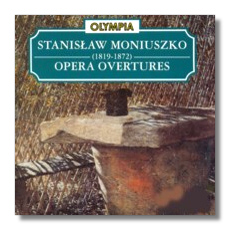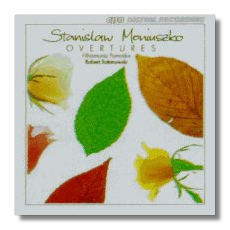
The Internet's Premier Classical Music Source
Related Links
- Moniuszko Reviews
- Latest Reviews
- More Reviews
-
By Composer
-
Collections
DVD & Blu-ray
Books
Concert Reviews
Articles/Interviews
Software
Audio
Search Amazon
Recommended Links
Site News
 CD Review
CD Review
Stanislaw Moniuszko

Opera Overtures
- Paria
- The Countess
- Verbum nobile
- Halka
- The Raftsman
- Concert Overture: Winter's Tale
- Concert Polonaise in A
- Mazur from Halka
Polish National Radio Symphony Orchestra/Grzegorz Fitelberg, Jan Krenz
National Philharmonic Orchestra/Witold Rowicki
Olympia OCD386 AAD 65:48


Overtures
- Halka
- The Countess
- Verbum nobile
- Jawnuta
- The Raftsman
- Paria
- Concert Overture: Winter's Tale
Filharmonia Pomorska Bydgoszcz/Robert Satanowski
CPO 999113-2 DDD 65:48

Vocal Works
- Piotrowin Mass in B Flat minor
- Motet "Ecce Lignum Crucis"
- Mass in E minor
- Litany of Ostra Brama IV
Fojt & Lehmann, trebles
Flicinska-Panfil, soprano
Polczynska-Nowak, mezzo-soprano
Grek, tenor; Galkla, bass; Kaminski (organ)
The Polish Nightingales/Wjciech A. Krolopp
Chant du Monde LCD2781093 DDD 63:43
Stanislaw Moniuszko is the major figure in Polish music between Chopin and Szymanowski, but he hardly compares in stature with either of those giants. His music is a standard product of provincial mid-Romanticism: tuneful, workmanlike, often charming - and rarely inspired. His considerable standing in Poland owes much to political factors: with the first performance of his opera Halka in 1858, he made his mark as a patriot at a time when Polish culture had been thoroughly suppressed by the occupying Russians - even the language was banned.
These two collections of operatic overtures and other short orchestral works, which overlap in all but three works, fill a gap in the catalogue - but it wasn't one that urgently needed filling. The form of the typical Moniuszko operatic overture is a simple patchwork of dance-tunes and marches. Some of them rise above this mundanity: the overture to Jawnuta, for example, on the CPO but not the Olympia CD, shows an orchestral imagination that owes something to the welcome influence of Berlioz; and the Halka Overture features music of genuine dramatic punch.
The Olympia recordings are thirty to forty years older than those on CPO: the first three date from 1952, conducted by Jan Krenz and and by the then Grand Old Man of Polish music-making, Grzegorz Fitelberg, close friend and supporter of Szymanowski and practical head of the "Young Poland" group that Szymanowski helped form in the hope of shaking Poland out of its provincial torpor. These recordings show what a good conductor Fitelberg was, for he gets a sparkle out of these largely workaday scores that the generally more cautious Robert Satanowski doesn't manage to find. The other Olympia recordings were made by Witold Rowicki in 1964; he, too, obtains much livelier performances than Satanowski, who, unsurprisingly, has a much better recorded sound for his dragging tempi.
Nor will the Chant du Monde CD of four of Moniuszko's religious choral works do much to set the seas on fire. If you are expecting an anticipation of the ecstatic intensity of, say, Szymanowski's Stabat Mater, forget it - this is music written for church use: there is no attempt to impress, there are no diverting melodies. It's just simple, honest music that doesn't hang around anywhere in the brain after you've listened to it. The performances are just up to the mark. Indeed, in its lack of superstar brilliance and the open vocal quality of its largely youthful performers, what you hear on this CD is probably very close to what Moniuszko would have expected in the Polish churches of his day. That's a recommendation of sorts, but I am afraid I can't many other reasons to enthuse about it.
Copyright © 1993 & 1998, Martin Anderson.
This review originally appeared in CD Review



















